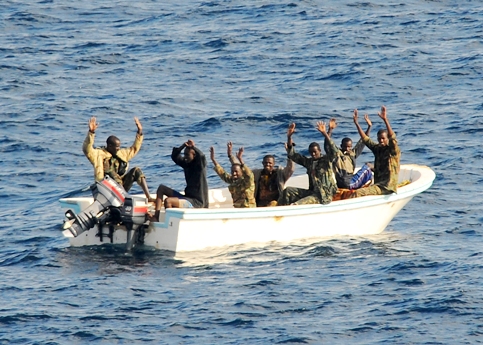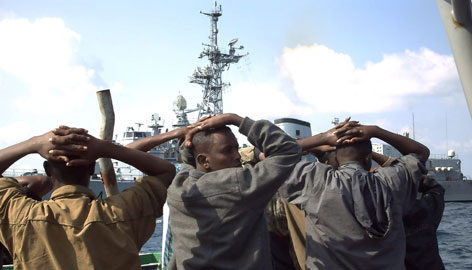U.S. Navy Finally Captures Some Pirates
A few months after a Pentagon spokesman
said that catching Somali pirates was not the U.S. Navy’s job, and that ship owners
should hire their own on-board security, the U.S. Navy has decided to follow in
the tradition of Stephen Decatur. We might add that both the French and British
had shown the way several months ago by capturing boatloads of the brigands and
delivering them to dungeons in Kenya. The Indian Navy even sunk a pirate mother
ship, or at least a vessel that looked like one, a few weeks ago.

|
|
Reach for the sky, pirates! U.S. Navy begins to redeem itself after “rent-a-cop” gaff. |
Reuters Report, March 5, 2009--
WASHINGTON, March 5 (Reuters) - The United States on Thursday turned over seven
suspected Somali pirates to Kenya for prosecution for the first time under a bilateral
pact that opened the way for the U.S. Navy to capture pirates on the high seas.
Officials told the U.S. Congress the custody transfer occurred as 28 countries affected
by recent pirate attacks met on Thursday in Copenhagen to seek consensus on further
efforts to prosecute suspects captured by an international naval force patrolling
off the coast of East Africa.
Piracy in the Gulf of Aden has become a major problem over the past six months,
forcing maritime insurance rates higher and providing pirates with ransoms averaging
between $1.5 million and $2 million, according to the U.S. Navy.
Seven ships and 123 mariners are currently being held by pirates.

|
|
Captain Hook got away but his days are numbered. |
The region's waterways, which connect the Middle East, Africa and Asia to Europe
through the Suez Canal, include some of the world's busiest shipping lanes.
"These threats are all fed in part by globalization, which radicalizes significant
numbers of people who feel alienated and disenfranchised," said U.S. Representative
Ike Skelton, Democratic chairman of the House of Representatives Armed Services
Committee.
Defense and diplomatic officials, who appeared at a hearing before Skelton's panel,
said the seven suspects transferred to Kenyan custody were captured by the U.S.
guided-missile cruiser Vella Gulf on Feb. 11, after a thwarted attempt to board
a Marshall Islands-flagged vessel.
It was the first time the U.S. Navy has exercised a bilateral agreement reached with Kenya in January that allows U.S.-captured pirate suspects to be tried in Kenyan
courts.
"This shows the agreement works," said Stephen Mull, acting undersecretary of state
for international security and arms control.
OTHER COUNTRIES
Mull said the United States wants other countries to agree to prosecute pirates
-- an option Washington has carefully avoided. Other interested countries include
Tanzania as well as those at the meeting in Copenhagen, which include countries
as far away as Japan.
Getting other countries to participate is key because of the large number of pirates
involved in attacks. Mull said as many as 30 pirates are believed to take part in
any single incident. Last year, there were 111 acts of piracy off the African coast.
"We can't just dump all the cases on Kenya," he told Reuters.
An unprecedented effort by naval forces from 18 countries including Russia and China
has helped curb attacks on cargo vessels from a November peak of 37 incidents to
17 in January and seven in February.
International counter-piracy efforts have made it harder for pirates to carry out successful attacks, according to Navy data that show the success rate falling to
15 percent this year from 38 percent in 2008.
But a U.S. commander who oversees a multinational naval coalition warned lawmakers
it is not clear the international effort can last long enough to combat a piracy
problem driven by Somalia's crushing poverty and political instability.
"The question is: where will we be a year from now? Will we continue to be effective?"
Vice-Admiral William Gortney said.
"There are a lot of resources being invested in this. Will the (European Union),
will NATO, will the other nations continue to do that? Keeping this international
support down there ... is very very important."
The international coalition is expected to grow in coming months with the arrival
of ships from Japan, Singapore, South Korea, Sweden, Belgium and Poland.
(Editing by Mohammad Zargham)